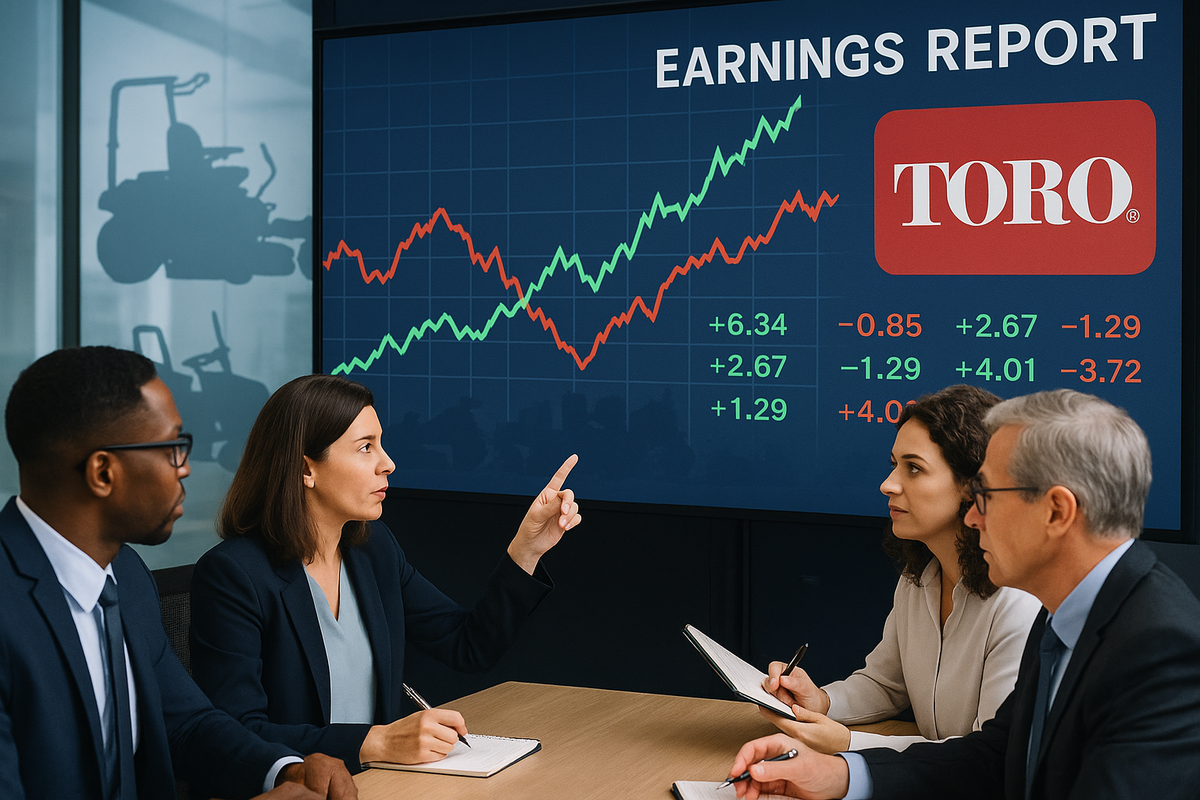
The Toro Company (NYSE: TTC) is anticipated to release its next earnings report on September 3 or 4, 2025, covering the fiscal quarter ending July 2025. This upcoming report is a crucial event for investors and analysts, as it will provide insights into the company's financial health, operational performance, and future outlook amidst varying market conditions. The report's details, particularly regarding earnings per share (EPS) and revenue, will be closely scrutinized to assess the company's ability to meet or exceed analyst expectations and navigate current economic headwinds.
Key Information
The Toro Company (NYSE: TTC) is projected to announce its earnings for the fiscal quarter ending July 2025 (Q3 2025) on September 3, 2025, or September 4, 2025. For this upcoming report, analysts have established a consensus EPS forecast of $1.22. This forecast represents a modest year-over-year increase of 3.39% compared to the $1.18 EPS reported in the same quarter of the previous year. The range of analyst predictions for the next quarter's EPS spans from $1.11 to $1.23.
Looking further ahead, The Toro Company has provided adjusted diluted EPS guidance for the full fiscal year 2025, ranging from $4.15 to $4.30. The current consensus EPS forecast among analysts for the entire fiscal year 2025 stands at $4.23.
Context and Background
The Toro Company's recent earnings performance has presented a mixed picture, reflecting both resilience in certain segments and challenges in others.
- Historical Context:
- Q2 2025 (reported June 5, 2025): The company reported an adjusted EPS of $1.42, which surpassed the consensus estimates of $1.38 or $1.40. However, revenue for the quarter experienced a 2.3% year-over-year decline, reaching $1.3 billion, falling short of consensus expectations. This revenue dip was primarily attributed to subdued consumer confidence and a delayed spring season, which impacted sales in some of its segments. Despite this, the Professional segment demonstrated strength, recording a 1% increase in net sales.
- Q1 2025 (reported March 6, 2025): TTC delivered an EPS of $0.65, exceeding the anticipated $0.63.
- Q4 2024 (reported December 18, 2024): The company's EPS of $0.95 was slightly below the consensus estimate of $0.96.
- Q3 2024 (reported September 5, 2024): TTC reported an EPS of $1.18, missing the consensus estimate of $1.23.
- Annual Performance: Annually, Toro's EPS has shown fluctuations. It stood at $4.01 in 2024 (a 28.12% increase from 2023), $3.13 in 2023 (a 25.48% decline from 2022), and $4.20 in 2022 (an 11.11% increase from 2021). For the twelve months ending April 30, 2025, Toro's EPS was $3.90, marking a significant 54.15% increase year-over-year.
- Relevant Trends: The company's performance is often influenced by factors such as consumer spending habits, weather patterns affecting landscaping and agricultural activities, and the strength of its professional segment, which caters to golf courses, sports fields, and commercial grounds. Weak consumer confidence and adverse weather conditions, as seen in Q2 2025, can directly impact sales, particularly in the residential segment.
Implications
The upcoming earnings report for The Toro Company (NYSE: TTC) carries several implications for its short-term performance and long-term outlook.
- Short-term Implications:
- Market Reaction: The immediate market reaction will largely depend on whether TTC meets, beats, or misses the analyst consensus EPS of $1.22 and revenue expectations. A beat could lead to a positive stock price movement, while a miss might result in a decline.
- Guidance Update: Investors will closely monitor any updates to the company's full-year fiscal 2025 guidance. Any revision, positive or negative, will significantly influence short-term sentiment.
- Segment Performance: Detailed insights into the performance of its Professional versus Residential segments will be crucial. Continued strength in the Professional segment could offset weaknesses elsewhere.
- Long-term Outlook:
- Strategic Initiatives: The report may offer insights into the progress of Toro's strategic initiatives, such as product innovation, market expansion, and operational efficiencies. These initiatives are vital for sustainable long-term growth.
- Economic Headwinds: The company's ability to navigate ongoing economic challenges, including inflation, interest rates, and consumer confidence, will be a key determinant of its long-term trajectory.
- Analyst Revisions: Post-earnings, analysts may revise their price targets and ratings for TTC, impacting the long-term investment outlook. Analysts currently expect Toro's earnings to grow from $4.41 per share to $4.67 per share in the next year, representing a 5.90% increase.
- Factors that Could Change the Situation:
- Consumer Spending: A rebound in consumer confidence and discretionary spending could significantly boost residential sales.
- Weather Patterns: Favorable weather conditions (e.g., early spring, sufficient rainfall) can positively impact demand for Toro's outdoor power equipment.
- Supply Chain Stability: Continued improvement in global supply chains could reduce production costs and improve product availability.
- Competitive Landscape: Intense competition in the outdoor power equipment market could put pressure on pricing and market share.
Summary
The Toro Company (NYSE: TTC) is scheduled to report its next quarterly earnings on September 3 or 4, 2025, for the fiscal quarter ending July 2025. Analysts are forecasting an EPS of $1.22 for this period. The company's recent financial performance has been mixed, with some quarters exceeding EPS expectations while facing revenue challenges due to factors like weak consumer confidence and unfavorable weather. The upcoming report will be critical in assessing TTC's ability to meet analyst expectations, manage ongoing economic pressures, and demonstrate the effectiveness of its strategic initiatives. Investors will be keen to see if the Professional segment continues its strong performance and if there are any positive shifts in the residential market, which could significantly influence the company's short-term stock performance and long-term growth prospects.





